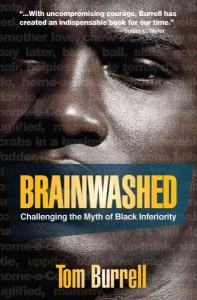(ThyBlackMan.com) Tom Burrell understands the power of the media.
The marketing communications and advertising pioneer revolutionized the images of African-Americans in television and print ads. He knows the difference between a campaign that prompts brand loyalty based on an appeal to a group’s values and one that plays to their insecurities. 
Burrell said he wrote his book, “Brainwashed, Challenging the Myth of Black Inferiority,” as a rallying cry to stop black people from seeing themselves as victims and regain control of their destinies.
The book calls for a “new brains campaign” – or “New Bs” – which would create and disseminate positive propaganda and mainstream the message about what is good in African-American life.
“It’s a go-to book; it’s a reference book to get people thinking and show them how the whole thing works and how the system of propaganda works,” Burrell told BlackAmericaWeb.
“I couldn’t help but do it,” he said. “I had been in the business for 45 years and studying black people for 45 years.”
In 1985, Burrell began looking at the purchasing patterns of African-Americans, and “I wondered why black people spent so many of their dollars on stuff – buying things, why are we doing it. I started looking to history and realized we had been stripped of our status, stripped of our culture, our relationships, everything. How do we get our status back? We try to buy it back.”
That explains why many African-Americans spend more of their disposable income on luxury goods – designer clothes, cars, jewelry, travel – instead of savings or investing money and focusing on higher education.
Negative propaganda that portray African-Americans as helpless and hapless have led to what Burrell calls the black inferiority – or BI – complex. It affects the way black people see themselves and can often lead them to pursue behaviors that work against them – crime, drugs, not taking care of their health.
What they are missing, he said, is a stronger sense of themselves based on a collective history of survival and triumph.
“Why, after all this triumph over adversity and winning against the odds – risking our lives to vote, in slavery learning how to read – why are we at the bottom of every list from employment, out-of-wedlock births, HIV/AIDS?” Burrell asked.
His book outlines the problems that besiege black people as a result of their inferiority complex and the ways in they buy into the images, but offers solutions, including developing a network of people and organizations with positive programs through his Web site, http://www.stopthebrainwash.eventbrite.com.
“We need to start pulling together and stop fighting each other over the 1 percent and start expanding the pie,” Burrell said.
“We have 41 million people in this country who are black. That’s the equivalent to the 30th largest country,” he said “larger than Spain, Argentina. We’re bigger than Canada, and we have $800 million in spending power, heading toward a billion dollars.”
Burrell is also encouraging people to think about how they use their purchasing power, especially their entertainment dollars, to buy music and patronize entertainers who uplift rather than denigrate black people. Too many African-Americans, especially the young, try to emulate the lifestyles – or what they believe are the lifestyles – of rappers, singers, comedians and other well-to-do celebrities.
“There’s a real correlation we make throughout the book, a cost-benefit analysis of how much these jokes cost us,” he said.
“We are three times more likely to kill our children by beating them to death than any other group,” Burrell pointed out, but comedians frequently tell jokes that advocate beating our children when they misbehave.
“People say, ‘It’s just lyrics, it’s just a joke,’” he said, “but when you look at the responses on our Web site, you can see that we look at performers differently. We take these people seriously. These are people whom we want to be like. They are our role models.”
Written By Jackie Jones




















Leave a Reply